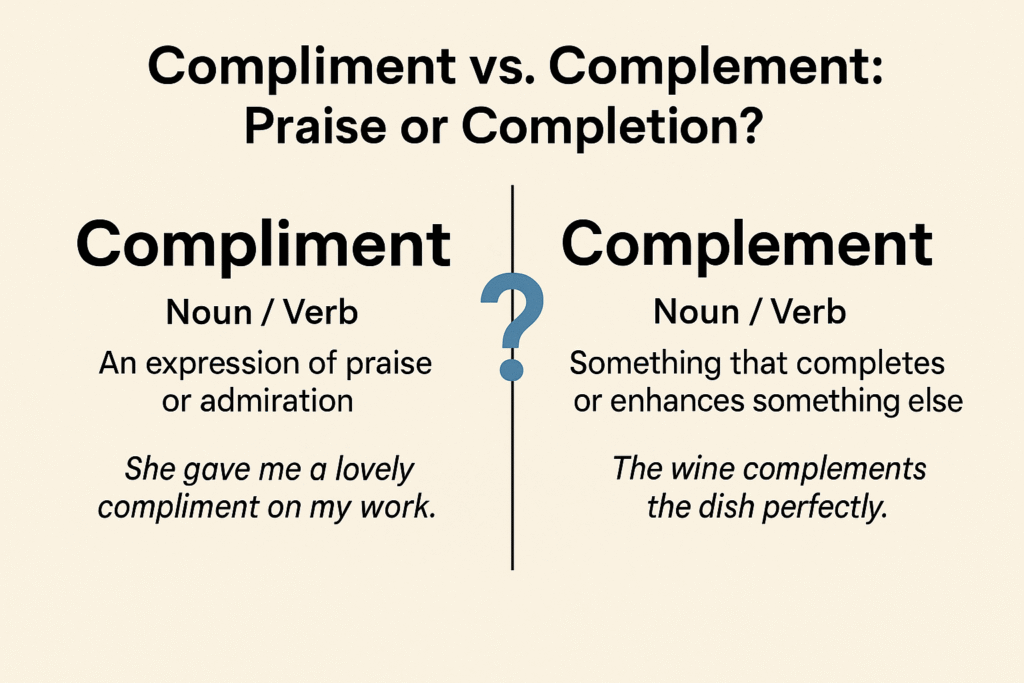Compliment or Complement: Praise or Completion?

Choosing between compliment or complement might seem like a small detail, but it can completely shift the meaning of your sentence. While these two words sound alike, they are not interchangeable. One refers to giving praise or admiration, while the other describes something that enhances or completes another thing.
Getting this choice right matters. If you write, “The red scarf is a lovely compliment to her dress,” you’ve used the wrong word, unless the scarf is somehow offering praise. The correct sentence would be, “The red scarf is a lovely complement to her dress,” meaning it completes or enhances the outfit.
In this guide, we will explain how to confidently choose between compliment or complement, share real-world examples, and highlight easy ways to remember the difference.
Related post: Judgment vs. Judgement: Understanding the Spelling Difference
Explore more: Check out other guides on spelling confusion
Compliment or Complement: Grammatical Explanation
Both compliment and complement function as nouns and verbs, but their meanings remain distinct.
| Word | Part of Speech | Meaning | Example |
|---|---|---|---|
| Compliment | Noun / Verb | An expression of praise or admiration | She gave me a lovely compliment on my work. |
| Complement | Noun / Verb | Something that completes or enhances another thing | The wine complements the dish perfectly. |
Verb Forms:
- To compliment someone means to praise them.
- To complement something means to complete or enhance it.
Also note:
- Complimentary (adjective) = expressing praise or free of charge.
- Complementary (adjective) = combining well or completing.
Understanding whether you need compliment or complement depends on what you are describing: words and praise, or matching and enhancement.
Examples of Compliment or Complement in Sentences
Correct Usage of Compliment:
- She gave him a thoughtful compliment on his presentation.
- May I compliment you on your excellent writing?
- They exchanged compliments after the performance.
Correct Usage of Complement:
- The red tie complements his suit beautifully.
- Strong teamwork complements technical skills on this project.
- These apps serve as useful complements to your main software tools.
Incorrect Usage:
- Incorrect: The dessert was the perfect compliment to the meal.
- Correct: The dessert was the perfect complement to the meal.
- Incorrect: She gave him a lovely complement on his speech.
- Correct: She gave him a lovely compliment on his speech.
Common Mistakes When Choosing Compliment or Complement
The most frequent mistake is using compliment when the correct choice is complement, especially when describing how two things work well together.
Writers also confuse the adjectives complimentary and complementary:
- Complimentary drinks (free of charge)
- Complementary colours (colours that enhance each other)
To avoid these errors, always ask:
- Are you talking about praise or kind words? → Use compliment.
- Are you describing things that complete or enhance each other? → Use complement.
For further confirmation, consult reliable resources like the Cambridge Dictionary or Merriam-Webster.
Memory Tips to Remember Compliment or Complement
Use these simple memory tricks:
- Compliment = Praise (people and words).
→ Think of the “I” in compliment as standing for Interaction or Individual praise. - Complement = Complete.
→ Both words start with “comple-”, linking directly to completion or enhancement.
Phrase to remember:
“Complements complete. Compliments flatter.”
If the sentence is about people or speech, it’s likely compliment.
If it’s about how two things work together, choose complement.
Conclusion: Compliment or Complement Made Simple
When deciding whether to use compliment or complement, always consider the meaning behind your words. If it’s about praise, choose compliment. If it’s about completion or enhancement, go with complement.
Getting this right not only improves your writing but also ensures your message is clear and effective.
Continue improving your writing by exploring more of our verb/noun confusion series.
Related post: Judgment vs. Judgement: Which Spelling Should You Use?